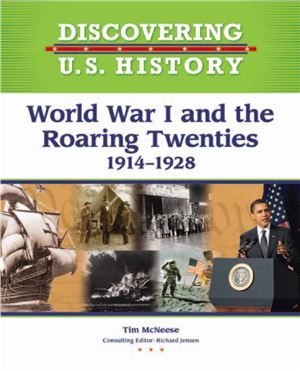Chelsea House Publications, 2010. - 136 pages.
"Discovering U.S. History" spans the complex and varied history of the United States from prehistoric times to the present day. This new chronological set can be read as a whole, providing readers with a comprehensive history, or as standalone volumes, with each title serving as a time capsule of a particular era. Each title brings to life the people and events that have shaped the nation through a clear and entertaining narrative, interesting boxed insets, and lively full-color and black-and-white photographs and illustrations. Students will find these books valuable for reports, prime supplements to textbooks, or simply interesting reading.
In 1914, the assassination of Austro-Hungarian Archduke Franz Ferdinand became the catalyst for a great war that swept over the world. Anxious Americans watched as the conflict widened and eventually engulfed their nation. President Woodrow Wilson believed a war would "make the world safe for democracy." When World War I ended, Wilson struggled to establish the League of Nations, the blueprint for the future United Nations, but the American public was more interested in technological advances like the automobile, radio, camera, refrigerator, and commercial aviation that changed the way they lived. In this new volume, lea how the United States experienced exciting and swift economic, technological, and social changes during World War I and the subsequent "Roaring Twenties."
"Discovering U.S. History" spans the complex and varied history of the United States from prehistoric times to the present day. This new chronological set can be read as a whole, providing readers with a comprehensive history, or as standalone volumes, with each title serving as a time capsule of a particular era. Each title brings to life the people and events that have shaped the nation through a clear and entertaining narrative, interesting boxed insets, and lively full-color and black-and-white photographs and illustrations. Students will find these books valuable for reports, prime supplements to textbooks, or simply interesting reading.
In 1914, the assassination of Austro-Hungarian Archduke Franz Ferdinand became the catalyst for a great war that swept over the world. Anxious Americans watched as the conflict widened and eventually engulfed their nation. President Woodrow Wilson believed a war would "make the world safe for democracy." When World War I ended, Wilson struggled to establish the League of Nations, the blueprint for the future United Nations, but the American public was more interested in technological advances like the automobile, radio, camera, refrigerator, and commercial aviation that changed the way they lived. In this new volume, lea how the United States experienced exciting and swift economic, technological, and social changes during World War I and the subsequent "Roaring Twenties."

